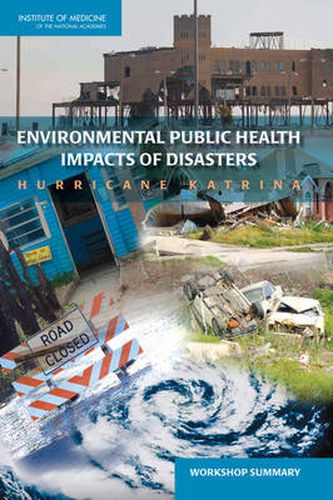Readings Newsletter
Become a Readings Member to make your shopping experience even easier.
Sign in or sign up for free!
You’re not far away from qualifying for FREE standard shipping within Australia
You’ve qualified for FREE standard shipping within Australia
The cart is loading…






Public health officials have the traditional responsibilities of protecting the food supply, safeguarding against communicable disease, and ensuring safe and healthful conditions for the population. Beyond this, public health today is challenged in a way that it has never been before. Starting with the 9/11 terrorist attacks, public health officers have had to spend significant amounts of time addressing the threat of terrorism to human health. Hurricane Katrina was an unprecedented disaster for the United States. During the first weeks, the enormity of the event and the sheer response needs for public health became apparent. The tragic loss of human life overshadowed the ongoing social and economic disruption in a region that was already economically depressed. Hurricane Katrina reemphasized to the public and to policy makers the importance of addressing long-term needs after a disaster. On October 20, 2005, the Institute of Medicine’s Roundtable on Environmental Health Sciences, Research, and Medicine held a workshop which convened members of the scientific community to highlight the status of the recovery effort, consider the ongoing challenges in the midst of a disaster, and facilitate scientific dialogue about the impacts of Hurricane Katrina on people’s health. Environmental Public Health Impacts of Disasters: Hurricane Katrina is the summary of this workshop. This report will inform the public health, first responder, and scientific communities on how the affected community can be helped in both the midterm and the near future. In addition, the report can provide guidance on how to use the information gathered about environmental health during a disaster to prepare for future events.
$9.00 standard shipping within Australia
FREE standard shipping within Australia for orders over $100.00
Express & International shipping calculated at checkout
Public health officials have the traditional responsibilities of protecting the food supply, safeguarding against communicable disease, and ensuring safe and healthful conditions for the population. Beyond this, public health today is challenged in a way that it has never been before. Starting with the 9/11 terrorist attacks, public health officers have had to spend significant amounts of time addressing the threat of terrorism to human health. Hurricane Katrina was an unprecedented disaster for the United States. During the first weeks, the enormity of the event and the sheer response needs for public health became apparent. The tragic loss of human life overshadowed the ongoing social and economic disruption in a region that was already economically depressed. Hurricane Katrina reemphasized to the public and to policy makers the importance of addressing long-term needs after a disaster. On October 20, 2005, the Institute of Medicine’s Roundtable on Environmental Health Sciences, Research, and Medicine held a workshop which convened members of the scientific community to highlight the status of the recovery effort, consider the ongoing challenges in the midst of a disaster, and facilitate scientific dialogue about the impacts of Hurricane Katrina on people’s health. Environmental Public Health Impacts of Disasters: Hurricane Katrina is the summary of this workshop. This report will inform the public health, first responder, and scientific communities on how the affected community can be helped in both the midterm and the near future. In addition, the report can provide guidance on how to use the information gathered about environmental health during a disaster to prepare for future events.